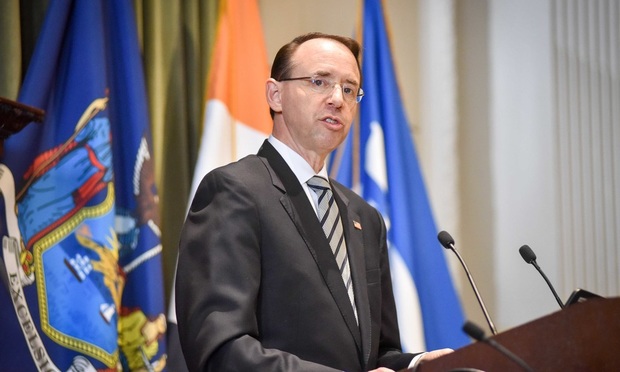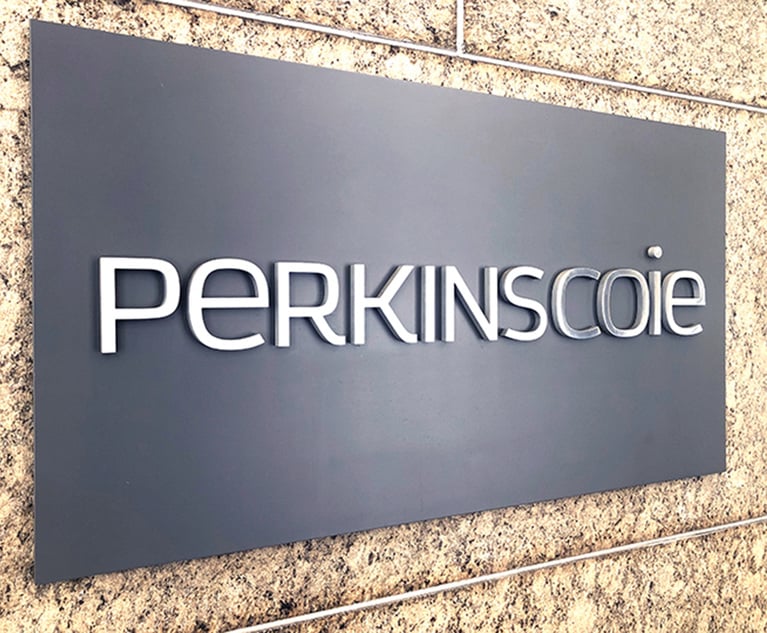'Democracy Is Messy': Ex-Deputy AG Rod Rosenstein Examines Election Snafus, Trump Twitter
With results from the Iowa caucuses held up Tuesday morning, former Deputy U.S. Attorney General Rod Rosenstein tells attorneys and technology experts at ALM's Legalweek conference in Manhattan what he learned from the 2016 election interference investigation.
February 04, 2020 at 01:27 PM
5 minute read
The original version of this story was published on New York Law Journal

With results from the Iowa caucuses held up Tuesday morning, former Deputy U.S. Attorney General Rod Rosenstein spoke to attorneys and technology experts at ALM's Legalweek conference in Manhattan about what he learned from leading the Department of Justice investigation into 2016 election interference.
"What we saw (in the probe into Russian hacking) was the impact that a concerted effort can have on, No. 1, the integrity of the system, but No. 2, public confidence in the integrity of the system," he said.
While Iowa Democratic Party officials have said the issues that delayed caucus results into Tuesday involved technical bugs and not hacking or another bad faith effort, Rosenstein said the situation illustrates the ongoing importance of ensuring that technology used in the United States is secure, high-functioning and protected from intrusion.
It also illustrates another principle, he said: "Democracy is messy."
The former prosecutor returned to that idea again and again throughout his conversation with Richard Caruso, vice president and general manager of global legal news for ALM.
The chaos or messiness involved in the American democratic process is a constant in the country's history, not something unique to the current moment, he argued.
He pointed out the positive side of political debate, noting that it shows people are free to have their own opinions and argue about them.
Even the messiness of the 24-hour news cycle is a good thing compared to plenty of other situations, like the current reports of suppressed information about coronavirus in China, Rosenstein said.
"You see the impact in a society like [China] that actually can achieve that, because they have control over sources of information," he said. "Here, we have some degree of chaos in our media, which has some downsides, but the upside is everything gets out. The information is ultimately uncovered, and that's a plus."
In a high-ranking role like deputy AG, Rosenstein said, he understood it would be impossible to avoid negative reports and criticism. He said it's wise to avoid watching too much TV or reading comments on Twitter. Caruso then read an audience question about whether President Donald Trump's Twitter account is a threat to the country.
"I don't think it's a danger to the country," Rosenstein said. "I do think it's a challenge."
He added that he has a Twitter account, but he doesn't use it much and definitely doesn't use it to "attack people."
In terms of his relationship with Trump while at the justice department, Rosenstein said the department is structured to reduce the possibility of excessive influence from any political figure. The executive branch's priorities can affect policy decisions in the department, such as where resources should go, but implementation must happen without political influence, he said.
Rosenstein remained aware that the president was not a lawyer or a prosecutor, he said.
"It was my job to make sure we followed the legal rules," he said.
"That must have been exciting," Caruso said.
"Exciting is one word for it," Rosenstein replied to laughter from the crowd.
He said he maintains great confidence in the American democracy and its judiciary. Some of the legal system's strengths were demonstrated by what didn't happen during the Senate trial following Trump's impeachment, he said.
"It's an interesting process as a lawyer to watch what's going on there, because it's legal-ish, right, but it's … very different," he said.
In court, attorneys are bound to follow rules of admissibility, while the Senate could bring in hearsay, he said. Lifetime appointments for judges and the requirement to prove a case beyond a reasonable doubt also help protect the rule of law, he said.
Rosenstein said he's still adjusting to working in private practice for the first time in his life, other than a spell as a summer associate decades ago. At King & Spalding in Washington, D.C., where he's now an equity partner, he said he's found the same collegiality he enjoyed in the Justice Department.
"Those of you who are in the private sector understand the billing in six-minute increments thing," he said. "I'm just kind of getting used to that!"
Rosenstein's DOJ predecessor James Cole, now a partner at Sidley Austin, has been barred by a Brooklyn federal judge from defending the Chinese telecom company Huawei because of conflicts of interest relating to his time in the Justice Department.
In response to a question about Cole, Rosenstein said there are so many rules about post-government work that he keeps a list of them in his office.
"When I joined the law firm, they asked me for a list of all the cases I worked on," he explained. "(At the justice department) we don't maintain any list like that."
Because cases sometimes pass briefly across a deputy AG's desk, he said, he isn't always sure about his conflicts and has to call the DOJ's ethics officer to confirm.
READ MORE:
DOJ's Rod Rosenstein, Job Searching Since September, Lands at King & Spalding
'Things Were Often a Bit Not Normal': Rod Rosenstein's Colleagues Say Goodbye
DOJ's Rod Rosenstein: 'You Definitely Won't Hear This on Cable TV'
This content has been archived. It is available through our partners, LexisNexis® and Bloomberg Law.
To view this content, please continue to their sites.
Not a Lexis Subscriber?
Subscribe Now
Not a Bloomberg Law Subscriber?
Subscribe Now
NOT FOR REPRINT
© 2025 ALM Global, LLC, All Rights Reserved. Request academic re-use from www.copyright.com. All other uses, submit a request to [email protected]. For more information visit Asset & Logo Licensing.
You Might Like
View All
Trump's DOJ Delays Releasing Jan. 6 FBI Agents List Under Consent Order
3 minute read
Judge Grills DOJ on Trump’s Birthright Citizenship Executive Order

Perkins Coie Backs Challenge to Trump's Ban on Transgender Military Service
4 minute read
Selendy Gay Files Lawsuit Challenging Trump's Workforce Reclassification EO
2 minute readLaw Firms Mentioned
Trending Stories
- 1States Accuse Trump of Thwarting Court's Funding Restoration Order
- 2Microsoft Becomes Latest Tech Company to Face Claims of Stealing Marketing Commissions From Influencers
- 3Coral Gables Attorney Busted for Stalking Lawyer
- 4Trump's DOJ Delays Releasing Jan. 6 FBI Agents List Under Consent Order
- 5Securities Report Says That 2024 Settlements Passed a Total of $5.2B
Who Got The Work
J. Brugh Lower of Gibbons has entered an appearance for industrial equipment supplier Devco Corporation in a pending trademark infringement lawsuit. The suit, accusing the defendant of selling knock-off Graco products, was filed Dec. 18 in New Jersey District Court by Rivkin Radler on behalf of Graco Inc. and Graco Minnesota. The case, assigned to U.S. District Judge Zahid N. Quraishi, is 3:24-cv-11294, Graco Inc. et al v. Devco Corporation.
Who Got The Work
Rebecca Maller-Stein and Kent A. Yalowitz of Arnold & Porter Kaye Scholer have entered their appearances for Hanaco Venture Capital and its executives, Lior Prosor and David Frankel, in a pending securities lawsuit. The action, filed on Dec. 24 in New York Southern District Court by Zell, Aron & Co. on behalf of Goldeneye Advisors, accuses the defendants of negligently and fraudulently managing the plaintiff's $1 million investment. The case, assigned to U.S. District Judge Vernon S. Broderick, is 1:24-cv-09918, Goldeneye Advisors, LLC v. Hanaco Venture Capital, Ltd. et al.
Who Got The Work
Attorneys from A&O Shearman has stepped in as defense counsel for Toronto-Dominion Bank and other defendants in a pending securities class action. The suit, filed Dec. 11 in New York Southern District Court by Bleichmar Fonti & Auld, accuses the defendants of concealing the bank's 'pervasive' deficiencies in regards to its compliance with the Bank Secrecy Act and the quality of its anti-money laundering controls. The case, assigned to U.S. District Judge Arun Subramanian, is 1:24-cv-09445, Gonzalez v. The Toronto-Dominion Bank et al.
Who Got The Work
Crown Castle International, a Pennsylvania company providing shared communications infrastructure, has turned to Luke D. Wolf of Gordon Rees Scully Mansukhani to fend off a pending breach-of-contract lawsuit. The court action, filed Nov. 25 in Michigan Eastern District Court by Hooper Hathaway PC on behalf of The Town Residences LLC, accuses Crown Castle of failing to transfer approximately $30,000 in utility payments from T-Mobile in breach of a roof-top lease and assignment agreement. The case, assigned to U.S. District Judge Susan K. Declercq, is 2:24-cv-13131, The Town Residences LLC v. T-Mobile US, Inc. et al.
Who Got The Work
Wilfred P. Coronato and Daniel M. Schwartz of McCarter & English have stepped in as defense counsel to Electrolux Home Products Inc. in a pending product liability lawsuit. The court action, filed Nov. 26 in New York Eastern District Court by Poulos Lopiccolo PC and Nagel Rice LLP on behalf of David Stern, alleges that the defendant's refrigerators’ drawers and shelving repeatedly break and fall apart within months after purchase. The case, assigned to U.S. District Judge Joan M. Azrack, is 2:24-cv-08204, Stern v. Electrolux Home Products, Inc.
Featured Firms
Law Offices of Gary Martin Hays & Associates, P.C.
(470) 294-1674
Law Offices of Mark E. Salomone
(857) 444-6468
Smith & Hassler
(713) 739-1250








